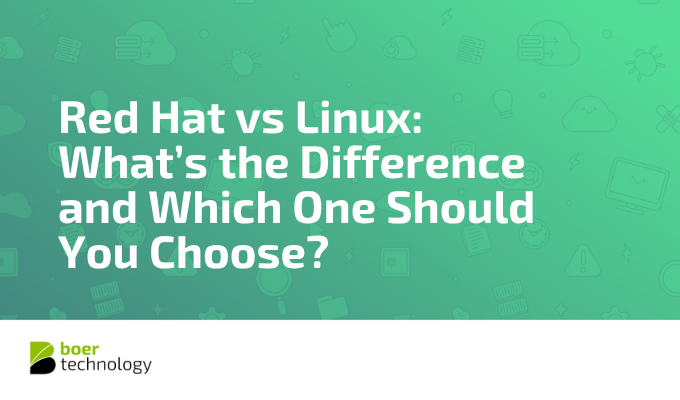Red Hat vs Linux: What’s the Difference and Which One Should You Choose?
If you’re new to Linux or considering an operating system for servers or enterprise environments, you might have heard of Red Hat Enterprise Linux (RHEL). But what exactly is the difference between Red Hat and Linux, and which one is right for you? This article will break it down in detail.
What is Linux?
Before discussing Red Hat, it’s important to understand what Linux is.
Linux is a kernel or core of an open-source operating system. It manages hardware, memory, processors, and software interactions.
Because Linux is open-source, anyone can use it to create their own distribution (distro). This is why there are so many Linux distributions, such as Ubuntu, Debian, Fedora, and of course, Red Hat Enterprise Linux (RHEL).
What is Red Hat?
Red Hat is a technology company that develops one of the commercial Linux distributions, Red Hat Enterprise Linux (RHEL).
Unlike free Linux distributions managed by the community, Red Hat operates on a paid business model. Users purchase licenses and official support, including security updates and technical assistance.
RHEL is designed for enterprise environments, offering stability, security, and professional support, making it suitable for large companies, servers, and critical applications.
Key Differences Between Red Hat and Other Linux Distributions
There are several key differences between Red Hat and other Linux distributions:
1. Business Model
-
Red Hat (RHEL): Paid with professional technical support.
-
Community Linux: Free, supported by open-source communities, sponsors, or donations.
2. Support and Updates
-
RHEL: Receives official security patches, updates, and professional support.
-
Free Linux: Support depends on community forums, which may not be as fast or comprehensive.
3. Intended Use
-
RHEL: Ideal for enterprise or servers requiring high stability and security.
-
Free Linux: Flexible, suitable for development, desktops, or personal servers.
4. Stability and Security
Red Hat emphasizes long-term stability, testing updates and patches thoroughly. Free Linux distributions may release features faster but sometimes lack enterprise-grade stability.
Who Should Choose Red Hat?
If you plan to work in large companies, become a sysadmin, or manage critical servers, Red Hat Enterprise Linux is the right choice. Its professional support and security updates make it an industry standard.
Additionally, experience with RHEL is valuable for careers in DevOps, cloud computing, and enterprise system management. Many large companies rely on RHEL for their servers, making this skill highly sought after.
Who Should Choose Free Linux Distributions?
If your goal is to learn Linux from scratch, develop software, or experiment, free Linux distributions are more suitable. Popular options include:
-
Ubuntu: Beginner-friendly with abundant tutorials.
-
Linux Mint: Windows-like interface, lightweight and stable.
-
Fedora: Faster feature releases, great for learning new technologies.
Free Linux allows flexibility to learn, tinker with systems, and build personal servers without license costs.
Red Hat vs Free Linux: Which is Better?
There’s no one-size-fits-all answer. It depends on your needs:
| Aspect | Red Hat (RHEL) | Free Linux |
|---|---|---|
| License | Paid | Free |
| Support | Professional, official | Community / forums |
| Focus | Enterprise, servers | Desktop, servers, learning |
| Stability | Very stable | Stable, depends on distro |
| Updates | Official patches | Community patches |
| Learning | Steeper learning curve | Easier for beginners |
In short, choose Red Hat for enterprise stability and professional support, and free Linux for learning or experimentation.
Start Your RHEL Journey!
Start your RHEL journey with Btech and gain access to genuine Red Hat Enterprise Linux subscriptions for your business. Btech helps organizations of all sizes acquire licensed RHEL solutions, ensuring you receive full support, updates, and access to Red Hat’s enterprise-grade ecosystem. Whether you’re deploying servers, managing critical applications, or scaling your IT infrastructure, Btech provides seamless procurement, subscription management, and guidance to maximize the value of your RHEL investment. Partner with us to secure authentic Red Hat solutions and take your Linux environment to the next level.
Conclusion
Linux is an open-source operating system that is flexible, while Red Hat Enterprise Linux is a commercial distribution focusing on enterprise stability, security, and professional support.
-
Choose Red Hat if you need an enterprise-grade environment or aim for a career as a sysadmin/DevOps engineer.
-
Choose free Linux if your goal is learning, experimenting, or software development.
Start your RHEL journey with Btech and gain access to genuine Red Hat Enterprise Linux subscriptions for your business.
contact@btech.id / +62-811-1123-242

